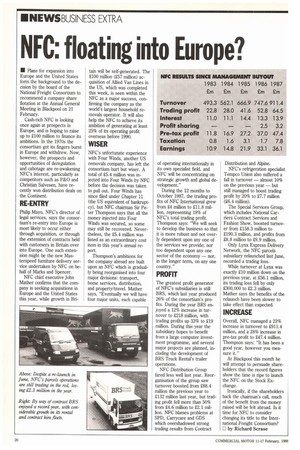NFC: floating into Europe?
Page 30

If you've noticed an error in this article please click here to report it so we can fix it.
• Plans for expansion into Europe and the United States form the background to the decision by the board of the National Freight Consortium to recommend a company share flotation at the Annual General Meeting in Blackpool on 21 February.
Cash-rich NFC is looking once again at prospects in Europe, and is hoping to raise up to £100 million to finance its ambitions. In the 1970s the consortium got its fingers burnt in Europe and withdrew. Now, however, the prospects and opportunities of deregulation and cabotage are re-awakening NFC's interest, particularly as competitors such as P&O and Christian Salvesen, have recently won distribution deals on the Continent.
Philip Mayo, NFC's director of legal services, says the consortium's re-entry into Europe is most likely to occur either through acquisition, or through the extension of contracts held with customers in Britain over into Europe. One such extension might be the new Masterspeed furniture delivery service undertaken by NFC on behalf of Marks and Spencer.
NFC chief executive John Mather confirms that the company is seeking acquisitions in Europe and the United States this year, while growth in Bri
tain will be self-generated. The $100 million (257 million) acquisition of Allied Van Lines in the US, which was completed this week, is seen within the NFC as a major success, confirming the company as the world's largest household removals operator. It will also help the NFC to achieve its ambition of generating at least 25% of its operating profit overseas before 1990.
NFC's unfortunate experience with Four Winds, another US removals company, has left the consortium hurt but wiser. A total of £5.4 million was injected into Four Winds by NFC before the decision was taken to pull out. Four Winds has since filed under Chapter 11 (the US equivalent of bankruptcy), but NFC chairman Sir Peter Thompson says that all the money injected into Four Winds was secured, so some may still be recovered. Nevertheless, the 25.4 million was listed as an extraordinary cost item in this year's annual rePort.
Thompson's ambitions for the company abroad are built upon an NFC which is gradually being reorganised into four major divisions: transport, home services, distribution, and property/travel. Mather says, "Eventually we will have four major units, each capable of operating internationally in its own specialist field, and NFC will be concentrating on strategic growth and global development."
During the 12 months to October 1987, the trading profits of NFC International grew from 24 million to £11.8 million, representing 18% of NFC's total trading profit. Thompson says: "We will seek to develop the business so that it is more robust and not overly dependent upon any one of the services we provide; nor too dependent upon any one sector of the economy nor, in the longer term, on any one country."
The greatest profit generator of NFC's subsidiaries is still BRS, which last year produced 26% of the consortium's profits. During the year BRS enjoyed a 12% increase in turnover to 2218 million, with trading profits up 33% to 219 million. During this year the subsidiary hopes to benefit from a large computer investment programme, and several major projects are planned, including the development of BRS Truck Rental's taller operations.
NFC Distribution Group fared less well last year. Reorganisation of the group saw turnover boosted from £88.4 million the previous year to £132 million last year, but trading profit fell more than 50% from 24.6 million to 22.1 million. NFC blames problems at SPD, Carrycare and GDS which overshadowed strong trading results from Contract NFC's refrigeration specialist Tempco Union also suffered a fall in turnover almost 10% on the previous year but still managed to boost trading profit by 20% to 27.7 million (26.4 million).
The Special Services Group, which includes National Carriers Contract Services and Fashion Show, boosted turnover from 2158.3 million to 2190.3 million, and profits from 28.8 million to 29.9 million.
Only Lynx Express Delivery Network, the NFC parcels subsidiary relaunched last June, recorded a trading loss.
While turnover at Lynx was exactly 210 million down on the previous year, at £56.1 million, its trading loss fell by only 2300,000 to £2.3 million. Mather says the benefits of the relaunch have been slower to take effect than expected.
Overall, NFC managed a 22% increase in turnover to 2911.4 million, and a 28% increase in pre-tax profit to 247.4 million. Thompson says: "It has been a good year, however you measure it."
At Blackpool this month he will attempt to persuade shareholders that the record figures show the time is ripe to launch the NFC on the Stock Exchange.
Ironically, if the shareholders back the chairman's call, much of the benefit from the money raised will be felt abroad. Is it time for NFC to consider changing its title to the International Freight Consortium? O by Richard Scrase




































































































